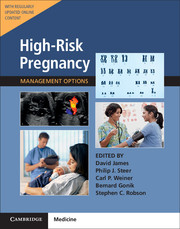Book contents
- Frontmatter
- Contents
- List of Contributors
- Preface
- Section 1 Prepregnancy Problems
- Section 2 Early Prenatal Problems
- Section 3 Late Prenatal – Fetal Problems
- Section 4 Problems Associated with Infection
- Section 5 Late Pregnancy – Maternal Problems
- 30 Substance Misuse in Pregnancy
- 31 Medication in Pregnancy
- 32 Hypertension in Pregnancy
- 33 Cardiac Disease in Pregnancy
- 34 Respiratory Disease in Pregnancy
- 35 Anemia and White Blood Cell Disorders in Pregnancy
- 36 Hematological Malignancies in Pregnancy
- 37 Thrombocytopenia and Bleeding Disorders in Pregnancy
- 38 Disorders of Coagulation in Pregnancy
- 39 Autoimmune Disease in Pregnancy
- 40 Diabetes in Pregnancy
- 41 Thyroid Disease in Pregnancy
- 42 Pituitary and Adrenal Disease in Pregnancy
- 43 Gastrointestinal and Liver Diseases in Pregnancy
- 44 Neurologic Complications in Pregnancy
- 45 Renal Disorders in Pregnancy
- 46 Spine and Joint Disorders in Pregnancy
- 47 Skin Disease in Pregnancy
- 48 Malignant Disease in Pregnancy
- 49 Pregnancy After Transplantation
- 50 Trauma in Pregnancy
- 51 Mental Health Disorders in Pregnancy
- Section 6 Late Prenatal – Obstetric Problems
- Section 7 Postnatal Problems
- Section 8 Normal Values
- Index
51 - Mental Health Disorders in Pregnancy
from Section 5 - Late Pregnancy – Maternal Problems
- Frontmatter
- Contents
- List of Contributors
- Preface
- Section 1 Prepregnancy Problems
- Section 2 Early Prenatal Problems
- Section 3 Late Prenatal – Fetal Problems
- Section 4 Problems Associated with Infection
- Section 5 Late Pregnancy – Maternal Problems
- 30 Substance Misuse in Pregnancy
- 31 Medication in Pregnancy
- 32 Hypertension in Pregnancy
- 33 Cardiac Disease in Pregnancy
- 34 Respiratory Disease in Pregnancy
- 35 Anemia and White Blood Cell Disorders in Pregnancy
- 36 Hematological Malignancies in Pregnancy
- 37 Thrombocytopenia and Bleeding Disorders in Pregnancy
- 38 Disorders of Coagulation in Pregnancy
- 39 Autoimmune Disease in Pregnancy
- 40 Diabetes in Pregnancy
- 41 Thyroid Disease in Pregnancy
- 42 Pituitary and Adrenal Disease in Pregnancy
- 43 Gastrointestinal and Liver Diseases in Pregnancy
- 44 Neurologic Complications in Pregnancy
- 45 Renal Disorders in Pregnancy
- 46 Spine and Joint Disorders in Pregnancy
- 47 Skin Disease in Pregnancy
- 48 Malignant Disease in Pregnancy
- 49 Pregnancy After Transplantation
- 50 Trauma in Pregnancy
- 51 Mental Health Disorders in Pregnancy
- Section 6 Late Prenatal – Obstetric Problems
- Section 7 Postnatal Problems
- Section 8 Normal Values
- Index
Summary
<b>Introduction</b>
Mental health disorders are common in pregnancy and after childbirth, and maternity services will encounter symptoms that vary in severity from the mild self-limiting to the potentially life-threatening as part of daily practice. Detecting women with, or at risk of, a serious mental health disorder and accessing appropriate care in a timely fashion is a shared responsibility. However, given the frequency of contact maternity service have with women through this period, maternity services have a pivotal role. From a mental health perspective, high-risk pregnancies are primarily associated with serious mental illness (psychotic illnesses and severe depressive episodes). However, given the challenges in interpreting emerging anxiety and mood symptoms, clinicians require a broader understanding of mental health presentations.
Overall 10–15% of women develop clinically significant anxiety or depressive symptoms in relation to pregnancy, and 0.4% experience psychosis. Perinatal mental health disorders generally have a good shortterm prognosis, yet without prompt and effective treatment are associated with adverse outcomes for both mother and child, including suicide, prolonged maternal morbidity, relationship breakdown, infanticide, neurodevelopment, poor parenting, obstetric complications, and emotional and behavioral difficulties in the child. Assessing these risks is a complex process and, as the Confidential Enquires into Maternal Deaths in the UK highlight, is imperfect. There is no single diagnosis or maternal factor that can determine the management of these risks; furthermore a generic response from services may actually act as a barrier for women accessing care which only serves to increase the risk. An individual assessment is required, and a collaborative management approach between maternity services, general practice, mental health, health visiting, and possibly social services needs to be undertaken through this crucial period in the woman's and child's life.
Given the frequency and spectrum of mental health disorders that maternity services encounter, obstetricians need to be able to employ specific skills in the management of mental health disorders in their day-to-day practice.
- Type
- Chapter
- Information
- High-Risk Pregnancy: Management OptionsFive-Year Institutional Subscription with Online Updates, pp. 1501 - 1522Publisher: Cambridge University PressFirst published in: 2017



